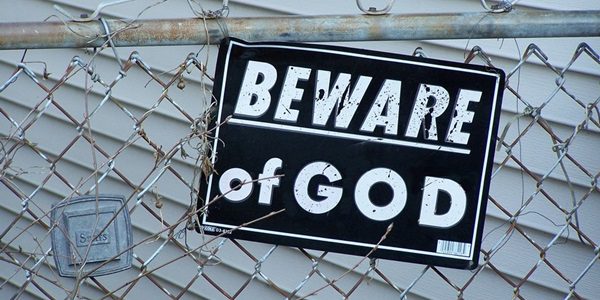
Many atheists argue that religion is a massive problem in our world. Since religion is the cause of major conflicts and violence, we would be much better off if we expelled religion from our midst.
As a Christian, it may surprise you that I think there’s a lot of merit to this atheist critique of religion. And René Girard helps us understand why.
Religion and violence have always been connected. “Violence and the sacred are inseparable,” wrote Girard in his book Violence and the Sacred. They are inseparable because religion solved the most urgent problem the facing primitive societies – their own violence.
Girard’s anthropology states that before religion formed in the ancient world, the greatest danger facing our early ancestors was their own violence against each other. Conflictual violence could not be contained and a war of all against all threatened our ancestors with extinction.
For Girard, the disease was violence. Just like modern medicine, the cure was found in the disease. Violence that threatened the community was channeled onto a single victim, who was violently sacrificed. Where there was once conflict that threatened the community, there was now peace that came from violently uniting against a common enemy. Whom Girard calls the scapegoat.
But the peace was only temporary. Conflicts re-emerged, violence threatened the community, and another scapegoat was sacrificed. The sacrifice was ritualized and religion was born.
I want you to notice the human aspect of religion. You don’t need God to explain religion, in fact, theology often gets in the way of understanding archaic religion. Religion didn’t emerge from the gods. They emerged anthropologically – from human violence. Religion in the form of sacrificial rituals solved the problem of human violence that threatened the community. Without sacrificial religion, says Girard, our ancestors never would have survived.
The scapegoat stands as a substitute for the community. Girard calls this the “surrogate victim.” The sacrifice underlies all of human culture. It seeks to expel a common enemy. Girard states that sacrifice is the “mechanism that assures the community’s spontaneous and unanimous outburst of opposition to the surrogate victim” (Violence and the Sacred, 300).
This is the irony – archaic sacrificial religions seek to expel a scapegoat, someone who is blamed for the violent problems facing the community. Archaic religion seeks to expel the scapegoat. But the modern propensity to expel religion is itself a religious act. Again, Girard,
Human beings are soon moved to make religion itself into a new scapegoat, failing to realize once more that the violence is theirs. To expel religion is, as always, a religious gesture—as much so today when the sacred is loathed and abhorred as in the past when it was worshipped and adored. (Things Hidden Since the Foundation of the World, 32).
We owe a great debt to archaic religions of sacrifice. They saved our ancestors from extinction, but they did so by doing a terrible thing – killing a scapegoat. The community truly believed that their scapegoat was guilty of causing all the problems that it faced. The people believed the sacrifice was good and necessary to protect the community from evil. In this way, modern atheists and secularists who want to expel religion are run by the same scapegoating principle as archaic religions. They scapegoat religion, not realizing that the real threat is not some evil other, be it a person or a religion. The real threat is our own scapegoating violence.
Indeed, to expel religion is just another violent religious act. The question is, can religion help us transform our sacrificial violence into something that will lead to lasting peace?
Girard distinguishes between archaic religions that sacrifice a scapegoat and the revealed religions of Judaism and Christianity. Instead of sacrificing scapegoats, these religions begin a process of caring for scapegoats. The story in Genesis where Abraham nearly sacrifices his son Isaac is about this move away from sacrificial violence. Instead of sacrificing humans, the ancient Hebrews moved to sacrificing animals. Sure, PETA would have a fit, but it was a radical move away from sacrificial religions.
In the Suffering Servant of Isaiah, we find the complete reversal of the sacrificial formula. Instead of someone sacrificing another, we find someone who is willing to be sacrificed by his fellow humans to show them the way of peace. The early Christians identified Jesus as the Suffering Servant. Jesus said, “Peace I leave with you; my peace I give to you. I do not give to you as the world gives.”
The world gives peace by violently sacrificing another, but Jesus gives peace by living a life of nonviolent love. It’s a love that extends even to his enemies. Instead of sacrificing another, Jesus allowed himself to be sacrificed. He became the scapegoat of the crowd. He was sacrificed by the political and religious authorities. He took religious violence upon himself so that he could redeem our religions and show us a better way of being religious.
That better way of being religious is defined in the New Testament by the epistle of James as this, “Religion that is pure and undefiled before God, the Father, is this: to care for orphans and widows in their distress, and to keep oneself unstained by the world” (1:27).
If Girard is right, then the world is fueled by the archaic religious impulse to sacrifice a scapegoat in the name of peace. That impulse is what unites all cultures, but it doesn’t lead to lasting peace. In fact, in a world with weapons of mass destruction, that impulse could lead to an apocalyptic destruction of our own making.
Religion that is pure is religion that keeps us unstained by the world’s involvement in scapegoating. Instead of scapegoating, God the Father reveals that pure religion leads us to acts of nonviolent love that seek to care for the scapegoats of our world.
For more on religion and sacrifice, see Patheos’s Public Square conversation – The Sacrifice: Religions and the Role of the Scapegoat.











